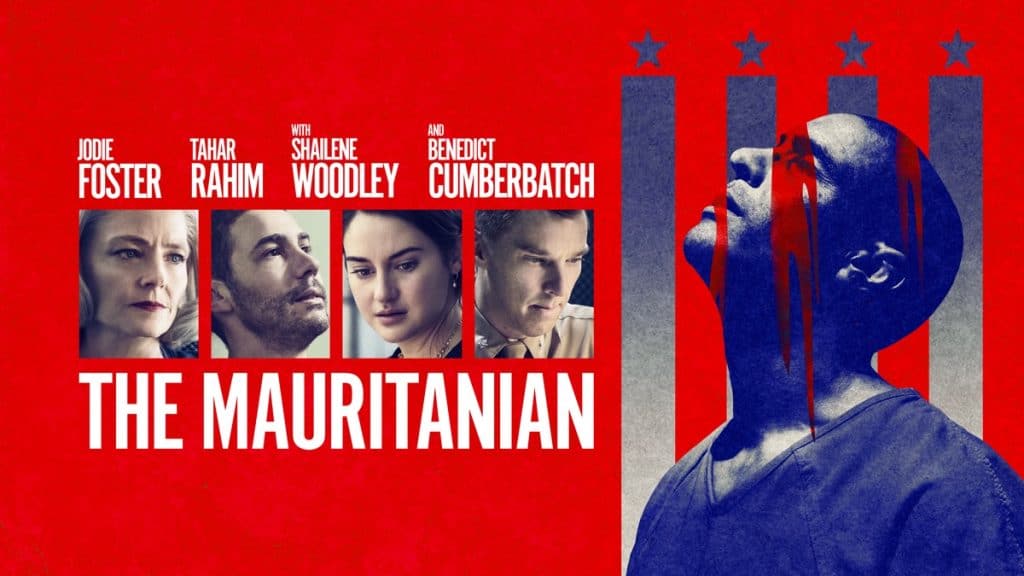Directed by: Kevin Macdonald
Produced by: 30West, Topic Studios, BBC Films, and others
Runtime: 2 hours 9 minutes
Released: 2021
Rated: R
Overview
The 2021 legal drama The Mauritanian, directed by Kevin Macdonald, is not just another film about the post-9/11 war on terror. It is a specific, humanizing, and deeply personal account of one man’s unimaginable ordeal. Based on the bestselling memoir Guantánamo Diary by Mohamedou Ould Slahi, the film tells the true story of a Mauritanian man held without charge for 14 years at the U.S. detention camp in Guantanamo Bay, Cuba.
For viewers and readers of Islamic Inquiry, the film offers a critical look at a dark chapter in recent history and provides a powerful, on-screen depiction of a Muslim man whose Islamic faith became his primary source of strength and solace amidst brutal injustice.
What is The Mauritanian About?
The film follows two parallel narratives. The first is that of defense attorney Nancy Hollander (Jodie Foster) and her associate Teri Duncan (Shailene Woodley), who take on the seemingly hopeless case of Mohamedou Ould Slahi (Tahar Rahim). Slahi, a Mauritanian electrical engineer, was accused of being a high-level recruiter for Al-Qaeda and was detained by the U.S. government following a tip-off, with no evidence presented against him.
The second narrative follows military prosecutor Lt. Colonel Stuart Couch (Benedict Cumberbatch), a man initially convinced of Slahi’s guilt and determined to see him executed. Couch is driven by a personal connection — his friend was a pilot on one of the planes flown into the World Trade Center.
As both legal teams delve into the case, the film systematically unravels the horrifying reality of Slahi’s detention: his torture, his forced confessions under duress, and the complete absence of any concrete evidence linking him to the 9/11 attacks.
Key Themes for an Islamic Perspective
While the film is a compelling legal thriller, its most significant moments for a Muslim audience revolve around Slahi’s inner life and his relationship with his faith.
- Sabr (Patience and Perseverance): Slahi’s story is a devastating modern example of sabr in the face of extreme oppression. The film shows him enduring years of isolation, sleep deprivation, temperature extremes, physical violence, and psychological torture. His ability to withstand this without breaking in spirit is a central theme. His patience is not passive; it is an active, enduring resilience that ultimately helps him survive.
- Faith as a Shield and Solace: In numerous scenes, we see Slahi turning to prayer and the Quran for comfort. He finds ways to pray in his cell, using his rituals to maintain a sense of order, peace, and connection to God when all human connection and hope are stripped away. The film presents his faith not as a source of radicalism, as his captors wrongly assumed, but as the very thing that prevents him from becoming radicalized by his hatred and despair.
- The Power of Dua (Supplication): One of the most touching aspects of his memoir, which the film captures well, is Slahi’s constant making of dua. He prays for his family, for his lawyers, and even for the well-being of his torturers. This reflects a profound Islamic ethic — to respond to oppression with dignity and even compassion, trusting in divine justice over worldly injustice.
- Justice and the Presumption of Innocence: Islam places immense emphasis on justice (adl) and the requirement for evidence (bayyinah). The Quran sternly warns against wrongdoing and bearing false witness. The entire premise of Slahi’s detention – imprisonment without charge, evidence, or trial – is a stark violation of these Islamic principles, as well as universal human rights. The film serves as a powerful critique of systems that abandon the rule of law out of fear and prejudice.
Important Considerations for the Viewer
- Graphic Content: The film includes realistic and disturbing depictions of torture. While not excessively gory, these scenes are psychologically intense and may be difficult for some viewers.
- A Human Story, Not a Political Lecture: While the political context is clear, the director focuses on the human stories of Slahi, Hollander, and Couch. It is their emotional and ethical journeys that drive the narrative, making the film’s message more impactful than a purely political documentary might be.
- Accuracy: The film is based on Slahi’s own account, which has been corroborated by U.S. government documents and his legal team. It is widely accepted as a truthful representation of his experiences.
Final Review
The Mauritanian is a difficult but essential film. It is a masterclass in acting, particularly from Tahar Rahim, who portrays Slahi’s intelligence, warmth, and traumatic breakdown with breathtaking authenticity. Jodie Foster and Benedict Cumberbatch also deliver powerful performances as individuals transformed by their encounter with a grave injustice.
For Muslim audiences, it is more than a well-made drama; it is a validation of a narrative often ignored or misrepresented in mainstream media. It portrays a Muslim man not as a threat or a stereotype, but as a complex, faithful, and deeply wronged human being. It shows how his Islamic faith was the cornerstone of his identity and his ultimate weapon against despair.
The film challenges viewers to remember the human cost of policies enacted in the name of security and to reflect on the eternal Islamic values of justice, patience, and unwavering faith in the face of adversity.
Where to Watch: Available for streaming on Netflix and Amazon Prime.
Want More?
This film was adapted from Slahi’s book Guantánamo Diary, an autobiographical account of his detention at Guantanamo Bay, Cuba, published in 2015 while he was still held there. In addition to his memoir, there is also a short documentary about Slahi and one of the prison guards that we’ve covered in another article. Visit our Media section for more.
💬 Comments
What did you think of The Mauritanian? Did the film’s portrayal of faith and resilience resonate with you? Share your thoughts in the comments below.

